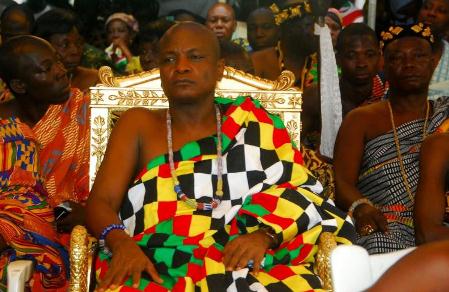Design strategies to meet people's aspirations
 The President of the Volta Region House of Chiefs, Togbe
Afede XIV, has observed that the main function of the chieftaincy institution
within the context of contemporary politics is for traditional rulers to design
plans and strategies to meet the aspirations of their people.
The President of the Volta Region House of Chiefs, Togbe
Afede XIV, has observed that the main function of the chieftaincy institution
within the context of contemporary politics is for traditional rulers to design
plans and strategies to meet the aspirations of their people.
Advertisement
He said at their own level, chiefs should be able to develop plans to complement efforts of central governments and not to compete with them to meet the development needs of the people.
Togbe Afede, who is the Agbogbomefia of Asogli, said this at a durbar at his court in honour of a 21-member delegation comprising two kings, paramount chiefs and government functionaries from the new state of South Sudan in Ho early this week.
He said chiefs should be able to devise ways of staying independent of the central government through appropriate laws pertaining to funding and with these, the chieftaincy institution could be out of government control and operate for a common cause with identified stakeholders of development.
The Agbogbomefia had briefed the delegation on the dynamics of the chieftaincy institution during pre-colonial and post colonial times in Ghana, stating that although some of the powers of chiefs had been usurped under political administration and modern governance, the institution was still relevant in the administration of justice at the grassroots level.
He commended the South Sudan state for their fight for self determination which had made them the 54th child of Africa and also the fight for rebuilding the nation.
In addition, he said the choice of Ghana as a case study was commendable since the country had been in the forefront of African integration and had established a chieftaincy institution which had contributed to making the nation an oasis of peace in the region.
The head of the delegation and presidential advisor to the South Sudanese government, Mr Tor Deng, said they were in Ghana to understudy the relationship with national government in terms of information dissemination and directives from the government.
He also said the tour would enable them to learn how the chieftaincy institution adjudicated justice at the grassroots and how they administered justice with neighbouring communities and also to study how law and order was managed in rural areas.
The caretaker deputy Volta Regional Minister, Mr Henry Ametefe, told the delegation that there was always harmony between government and traditional authorities and that it was central to maintaining cultural values in accordance with the Constitution.
For his part, a facilitator of the delegation, Professor Kwesi Prah, said service delivery in South-Sudan had been shattered over the last 50 years and that the visit was a process aimed at resurrecting and rebuilding institutions including the chieftaincy administration towards the refining of processes into concrete realities for building a relationship that will endure on a peaceful and profitable basis.
A former guerrilla fighter, who is now a Member of Parliament(MP) in South Sudan, Mr James Lual, said his visit as part of the delegation was a respite in view of the fact he once visited Ghana to seek peace, dialogue and support from Ghana to fight the war which had been ultimately won with independence granted today.
The delegation had already visited South Africa and Botswana as part of a strategy to learn from some African countries towards the rebuilding of the new state of South Sudan.
Present at the durbar were members of the select committee of the regional house of chiefs and wing chiefs of Asogli. The guests were entertained to traditional music from the Asafo and Boborbor groups.



